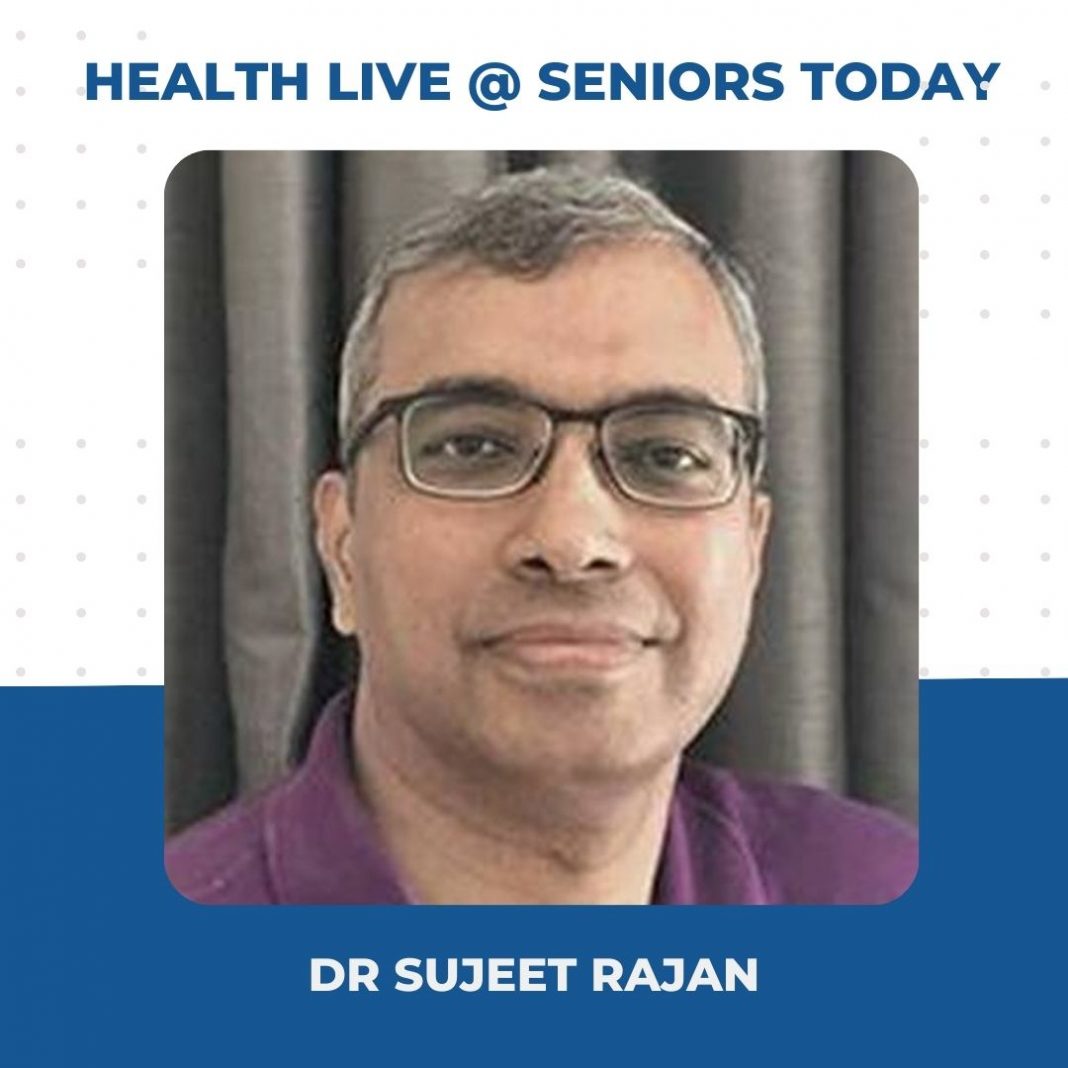On May 1, Seniors Today hosted its weekly Health Live with Dr Sujeet Rana, and he spoke on how seniors can better cope with dealing with the second wave of Covid-19
Dr Sujeet Rajan is a leading respiratory physician in Mumbai, India. He graduated from the Grant Medical College in Mumbai in 1989 and post graduated in respiratory medicine from the Seth GS Medical College and KEM Hospital, also in Mumbai, in January 1994. He also holds a Diploma in Environmental, Tuberculosis and Respiratory Diseases from the CPS (College of Physicians and Surgeons) in Mumbai.
Following his post-graduation, Dr Rajan has been actively involved in research and clinical practice at the Bombay Hospital and Bhatia Hospital, both in Mumbai.
His areas of interest include interstitial lung fibrosis, airway disease, sleep disorders and end-stage lung disease. The research he has done has focused around these areas, especially asthma, COPD and diffuse lung disease. He runs an ILD clinic with online MDD discussions.
Dr Rajan is also a postgraduate teacher at the Bombay Hospital. He was also the European Respiratory Society’s National Representative from India from 2015 to 2018. As the Indian Editorial Adviser for the American Journal of Respiratory and Critical Care Medicine, he has over 38 publications to his credit.
Here are some excerpts from the webinar:
If you have symptoms that are uncharacteristic for your routine, the symptoms persist and if you have a member of the family who has tested positive- you might want to get a little more alert.
It takes 2-11 days for the symptoms to start presenting. If you have been in contact- less than 2m distance or for more than 15 minutes with a positive patient, it takes 2-11 days for you to start showing symptoms.
Some early symptoms of Covid-19 include:
- Sore throat
- Fever
- Cough
- Headaches- they come on a little later
- Generalised weakness
- Fatigue
- Myalgia and arthralgia
- Breathlessness – in a small percentage of people after day 5-6
- Loss of smell and taste
If you are living at sea level, then your spO2 above 95% is normal, that however is not written in stone. If you are obese, your spO2 might drop to 93-94% on lying down. If you suffer from sleep apnea it tends to drop by 2-3% on lying down and even more on snoring and that is because of the closing of the upper airways and not because of Covid related pneumonia.
If you check your oxygen saturation regularly, you will have a better idea about what your normal values are and if your spO2 consistently keeps dropping by 2-3% it is something to worry about.
Walk test- it is a standard test for respiratory lung function. A 3% reduction in your lung function after a 6 minute walk is a cause for concern. Normally our saturation should go up after walking since we are upright; lugs are better expanded, carrying in more oxygen in our blood.
Just buying a concentrator does not make sense. It is not a small device and Dr Sujeet would not recommend managing patients on oxygen at home. Buying a concentrator helps you buy time while you make other arrangements.
You can manage a patient with low flow oxygen but you will have to monitor the patient strictly. The patient might need steroids of remdesivir which is not easy to manage. You might need an anticoagulant too. For all that, you cannot manage that at home.
An RT-PCR is to diagnose Covid and not monitor it. Your RT-PCR for Covid-19 can test positive for up to 2-3 months. It makes no sense to do RT-PCRs repetitively.
The only time you need a second swab is in severely immunocompromised patients, patients with HIV, patients on multiple immunosuppressants, cancer patients on chemotherapy. Those are the patients whose immunity is so low that they may harbor replicating virus for a little longer.
The false positivity rate report for RT-PCR for Covid is less than 1%. The false negative is somewhere between 20-30%. It is the false negatives that we are worried about. If your test result comes out negative and you still suspect Covid get another test and if that too comes negative, you are advised to get a scan. 2 negative reports and high suspicion for Covid is an indicator for getting a CT scan.
As long as the part time domestic help that comes to your place wears a proper mask, stays at a safe distance and is responsible enough to not come to work if they are feeling unwell, it is okay for them to come to work.
The only time your mask can be removed, should come down is when you’re with your immediate family. At all other times your masks should stay up.
Vaccines prevent you from getting severe Covid and hospitalization.
You can get either of the 2 vaccines. But we avoid Covishield in patients who have a history of thrombosis, clots, DVT, pulmonary embolism.
If you are on antibiotics, delay taking your vaccine. Wait until the infection has subsides.
Even after getting vaccinated, you can get infected with Covid. Dr Sujeet compares the vaccine to a seatbelt. Having a seatbelt does not guarantee that you won’t crash the car, if you drive recklessly but it protects you from serious injury.
You can get your dose for the Covid-19 vaccination on the scheduled date even if you have had Covid in the past. You can get your vaccine 4 weeks after you first developed symptoms of covid.
To be fool proof that you are negative for Covid, you will need a negative viral culture- a test that is only done in Nation Institute of Virology or Virology, Pune. But thankfully we don’t have to do that for everyone because we know from good research that there is no replicating virus in almost everyone under the age of 50by day 14. And almost negligible by day 10. Over the age of 50, very rarely you can see a replicating s virus by day 20.
As a rule of thumb, it is said that by day 11 you can step out but wear a mask. For elderly patients, they can step out of isolation after day 20-21.




